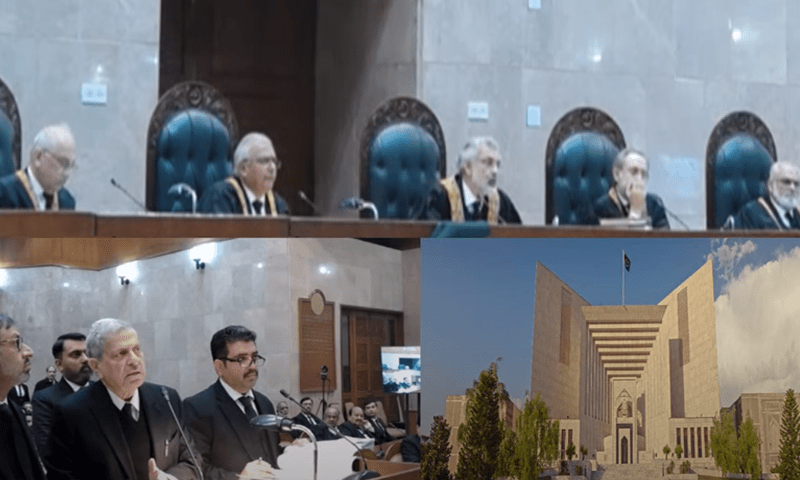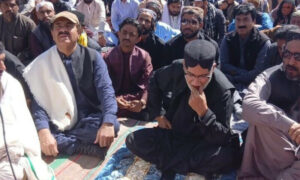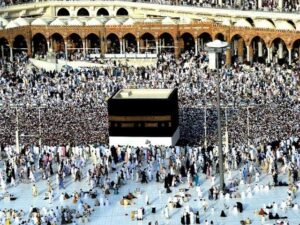The Supreme Court (SC) on Tuesday reserved its verdict on a petition filed by former Islamabad High Court senior puisne judge Shaukat Aziz Siddiqui against his removal.
A five-member bench — led by Chief Justice of Pakistan (CJP) Qazi Faez Isa and including Justice Aminuddin Khan, Justice Jamal Khan Mandokhail, Justice Hasan Azhar Rizvi, and Justice Irfan Saadat — heard the plea. The proceedings were broadcast live on the apex court’s website.
In his petition, the former judge had challenged a decision of the Supreme Judicial Council (SJC) about his dismissal from service and an Oct 11, 2018 notification under which he was removed for a speech he had delivered at Rawalpindi Bar Association.
In his speech, Justice Siddiqui had accused the Inter-Services Intelligence (ISI) of influencing the court proceedings and forming benches of choice.
A day earlier, former ISI director general retired Lt Gen Faiz Hameed submitted his response to Justice Siddiqui’s petition. In his response, he rejected the allegations of his involvement in the constitution of IHC benches to prolong the detention of former premier Nawaz Sharif and his daughter Maryam Nawaz.
The ex-spymaster claimed Justice Siddiqui had dragged him into the case for no reason.
At the previous hearing, notices had been issued to Gen Hameed, retired brigadier Irfan Ramay, former IHC chief justice Anwar Khan Kasi and former SC registrar Arbab Muhammad Arif.
Siddiqui had nominated seven individuals in his amended plea, however, the court remarked that three others — former chief of army staff Qamar Javed Bajwa, and two retired brigadiers Faisal Marwat and Tahir Wafai — had no direct connection with the case.
During the hearing today, CJP Isa said the court could not punish anyone without conducting an inquiry. “The SC has to draw a line on the difference between the Supreme Court and the Supreme Judicial Council,” he observed.
“If removing a judge is so easy, then this is a threat to the independence of the judiciary,” the top judge further noted, adding that the current matter was public and people had a right to know the truth.
The hearing
During the hearing, Khawaja Haris appeared as Gen Hameed’s and brigadier Ramay’s counsel while Wasim Sajjad was present as Justice Kasi’s lawyer. Hamid Khan appeared as the petitioner’s counsel.
At the outset, Haris came to the rostrum and informed the court who he was representing.
Justice Siddiqui’s lawyer urged the court to conduct a “fair inquiry” of the matter, arguing that under Article 209(6) of the Constitution, the SJC could not present a report to the country’s president without conducting an inquiry.
When asked about the allegation against his client, Hamid answered it pertained to a speech and urged the court to quash the decision against Siddiqui.
CJP Isa asked whether the ex-judge “admitted the allegations against him or rejected them”, to which the lawyer replied that his client had denied all allegations levelled against him. The top judge then noted that former SC registrar Arbab had submitted his response as well.
Hamid then asserted that the ex-registrar had said he had brought the matter to the notice of then-IHC chief justice Kasi, whose lawyer then came to the rostrum.
The chief justice then asked how the case should proceed ahead, to which Hamid said: “The submitted responses have made my case clear. The SJC had not conducted any inquiry. If there had been an inquiry, witnesses would have appeared [and] cross-examination would have been allowed.”
The counsel then requested that the order to remove the former judge be declared unlawful.
At this, the CJP observed that according to Attorney General of Pakistan (AGP) Mansoor Usman Awan, a factual inquiry“ had not been conducted, wondering how the five-member SC bench could then decide on the case.
“What would happen if […] it is not determined whether the allegations are false or true?” Justice Isa asked, noting that the claims were made in public. “Will the decision of the judge’s removal be maintained if the allegations are proven false?”
In response, Hamid said that the decision against his client should first be set aside and then a commission should be constituted to conduct an inquiry.
CJP Isa then asked if the matter could be referred back to the SJC, to which the ex-judge’s lawyer replied in the affirmative.
At this point during the hearing, Justice Mandokhail said, “Let’s assume that the allegations (made by Siddiqui) are true but was it appropriate for a judge to make such a statement? You have not denied making the speech.”
The chief justice also wondered, “Is any judge allowed to make such a speech?”, at which Hamid acknowledged that the speech could not be denied.
Justice Mandokhail again wondered if Siddiqui’s conduct as a judge was “appropriate” while Justice Isa noted that a speech could be of “two kinds”.
“Is a judge not allowed to make a speech? I think we should not forget the fact. […] If the fact was making the speech, then half of the judiciary will have to go home,” the top judge remarked.
“It is not the question of mere making of the speech. It is the content of the speech,” he observed, adding that if allegations were made in the speech or a “vicious or loaded attack” was launched, the two elements could not be “disconnected”.
“Making a speech is your right, anybody’s right,” CJP Isa stated, before giving examples of judges in Britain giving interviews to the media and those in the United States participating in debates.
The chief justice asked if the case could be remanded back to the SJC, to which Haris, Gen Hameed’s lawyer, replied in the negative. He said that Siddiqui had retired as a judge and could not be restored to the role, therefore, the SJC could no longer review the matter.
“If the Supreme Judicial Council’s recommendation is set aside, then the allegations would be deemed true,” Justice Isa remarked. Haris then contended that “no allegation” was made against Gen Hameed either during the speech or before the SJC.
The lawyer further said that the SJC had noted that the former judge had “dishonoured the judiciary”. To this, CJP Isa wondered, “Where did the matter of dishonouring the judiciary come from?”
When Haris argued that the judge should not have made a public speech, the chief justice asked him what article of the SC’s code of conduct Siddiqui had allegedly violated and told him to read the code of conduct for judges.
“A judge should not get into public and political controversies,” Gen Hameed’s counsel asserted, insisting that the “judiciary was ridiculed in the speech”.
“The speech could also be seen as an indicator instead of for publicity,” the top judge remarked. When asked what should a judge do in case there was corruption in an institution, the lawyer said they should inform the CJP. At this, Justice Isa said that there should be “some criteria for accepting a chief justice’s statement and for not accepting another’s”.
“The nation has endured enough now. Our concern is related to the institution’s reputation. The nation should know the truth,” the chief justice remarked.
CJP Isa once again asked how the matter should proceed, at which Haris urged the court to take a suo motu notice. “The nation should also know whether the allegations are true or false. The institutions are for serving the public,” the top judge said.
At this point during the hearing, it emerged that the federal government challenged the Afiya Shehrbano Zia verdict, which held that judges who retire or resign do not fall within the ambit of Article 209 of the Constitution determining misconduct of superior court judges.
Here, AGP Awan urged the apex court to hear the appeal along with the current case. He hoped that the number to the appeal would be allotted in a day or two, contending that a judge could not be removed without an inquiry as the matter was linked to fundamental rights.
Meanwhile, Hamid said the case was “one of its kind” where a judge was removed without inquiry. He added that a detailed judgment should be issued explaining why an inquiry was essential before the removal of a judge.
He further contended that a judge could not be removed without presidential reference as per the 1956 and 1962 Constitution. “This was the condition in the 1973 Constitution as well,” the lawyer stated, adding that a procedure other than a presidential reference was introduced in the Constitution for the first time in 2005.
Here, Justice Rizvi wondered if there was a need for inquiry when a judge’s speech was clear and available. “There are also allegations of corruption Shaukat Aziz Siddiqui,” he said.
Hamid, however, maintained that inquiry in Siddiqui’s case was required.
More to follow











